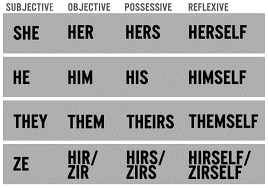The words that we use to refer to ourselves and those that identify with other types of gender identities are personal. Using the correct pronouns when referring to another individual is absolutely essential; it is a sign of respect. A growing number of children, adolescents, and adults have gender identities that differ from their birth sex, so it is important for them to be referred to accordingly using the correct pronouns to foster acceptance and freedom for them to be who they truly are. Whether it means using he/him, she/her, they/them, or ze/hir, people deserve to be welcomed and accepted no matter what their gender identity is. Below is a breakdown pronouns before we talk more about why they matter:

*They/them are used by those who identify as non-binary that do not identify as either male or female. *Ze/hir pronouns can be used for those who identify as non-binary, genderfluid, genderqueer, transgender, and/or don’t identify with the gender binary.
Using the correct pronouns matters because pronouns make us who we are, and it is one of the many ways we identify ourselves. Specifically, gender pronouns reflect how we think and feel about ourselves and how others see us. While mistakes do happen, what is important is that you make an honest effort to address someone using their correct pronouns. If you purposefully misgender someone by using the correct pronouns, it is considered oppression and can cause the person to feel dysphoria, exclusion, and alienation. Those who are referred to by their correct pronouns feel a sense of acceptance and can be free to be who they are without any fear of oppression, which is a right of those of all genders. It also lowers the risk of suicide and symptoms of depression, specifically in transgender youth.
The takeaway here is that it is essential to treat others with respect regardless of their gender identity. Using the correct pronouns facilitates respect and helps people feel more comfortable in their own skin.
For more information on pronouns, check out the resources below:
- https://lgbtlifecenter.org/pronouns/
- https://www.edi.nih.gov/blog/communities/what-are-gender-pronouns-why-do-they-matter
By Kristi Zalinka, Capital EAP Intern
